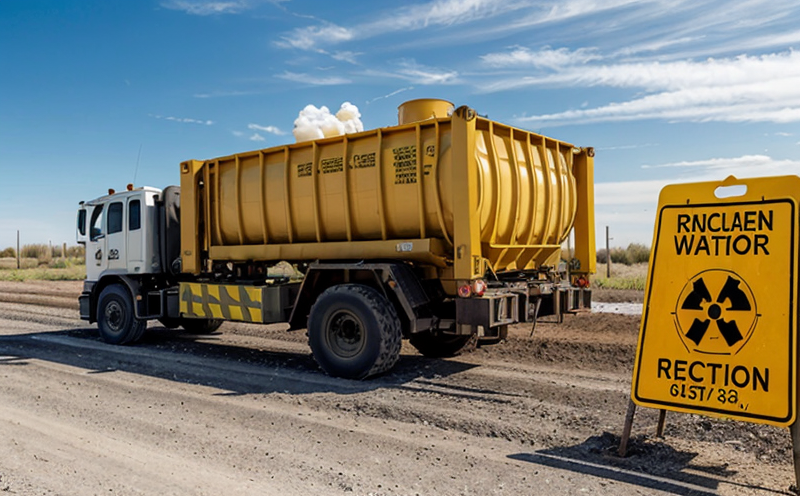EN 257 Radiation Dose Rate Measurement near Waste Containers
The European Standard EN 257 specifies procedures and criteria for measuring radiation dose rates in proximity to waste containers. This service is critical for ensuring the safe handling, transportation, and disposal of radioactive and nuclear waste materials. The standard aims to protect personnel involved in these activities by providing a method to quantify potential exposure accurately.
The measurement process involves placing dosimeters at specified distances from waste containers to determine the dose rate received by an individual standing 1 meter away for 30 minutes, as per the standard. This distance and duration are chosen based on occupational exposure limits set out in international standards such as ICRP (International Commission on Radiation Protection).
The dosimeters used must comply with specific requirements outlined in EN 257 to ensure accuracy and reliability of the measurements. These dosimeters can be either passive or active, depending on the level of detail required. Passive dosimeters do not require external power but provide lower resolution data compared to active systems which offer continuous monitoring.
After deployment, the dosimeters are collected and analyzed in our laboratory according to established protocols. The results are then reported back to the client within a predefined timeframe, typically no more than 7 days from sample collection. Compliance with this standard is mandatory for facilities handling radioactive or nuclear waste under EU directives.
The importance of adhering strictly to EN 257 cannot be overstated given its role in safeguarding human health and environmental integrity. Non-compliance could lead to significant penalties, including fines and operational disruptions. By providing comprehensive testing services aligned with this standard, we contribute directly towards maintaining high standards across the industry.
Our team of experts ensures that every aspect of the EN 257 procedure is followed rigorously from initial setup through final analysis. We employ state-of-the-art equipment calibrated specifically for these types of measurements to guarantee precise results. Additionally, our personnel are trained extensively in radiation safety practices ensuring they handle all materials safely and responsibly.
In summary, adhering to EN 257 not only meets regulatory requirements but also demonstrates a commitment to employee welfare and environmental protection. Our laboratory is fully equipped and certified to perform these tests accurately and efficiently, offering peace of mind for those responsible for managing radioactive or nuclear waste.
International Acceptance and Recognition
The European Standard EN 257 enjoys widespread international recognition due to its stringent requirements and comprehensive approach to radiation dose rate measurement. Many countries outside Europe have adopted similar standards based on the principles established by EN 257, reflecting its global significance.
- United States: The U.S. Nuclear Regulatory Commission (NRC) recognizes EN 257 for certain applications where it aligns with domestic regulations.
- Canada: Canadian nuclear facilities often reference EN 257 during audits and inspections conducted by Atomic Energy of Canada Limited (AECL).
- Australia: Australian standards bodies frequently cite EN 257 when evaluating compliance related to radiation safety measures.
The acceptance of EN 257 extends beyond regulatory bodies; industry associations worldwide also recommend adherence to this standard for best practices in nuclear and radioactive waste management. This broad recognition underscores the importance of implementing consistent methodologies globally, enhancing overall safety standards across borders.
Environmental and Sustainability Contributions
The implementation of EN 257 plays a pivotal role in environmental protection by minimizing risks associated with handling and disposing of radioactive or nuclear waste. By accurately measuring radiation dose rates near waste containers, the standard helps identify potential hotspots where stricter controls may be necessary.
| Parameter | Description | Significance |
|---|---|---|
| Radiation Dose Rate Measurement | The rate at which radiation is emitted from a source, measured in units like rem/hour or mSv/h. | Helps assess immediate and long-term impacts on the environment. |
| Distance and Duration | Standard distances and durations for placing dosimeters around waste containers. | Avoidance of over-estimation or under-estimation of radiation exposure. |
| Data Accuracy | The precision and reliability of the measurement results obtained using compliant dosimeters. | Ensures accurate representation of actual conditions, facilitating informed decision-making. |
Through meticulous adherence to EN 257, organizations involved in waste management can contribute significantly towards sustainable practices by ensuring minimal disruption to ecosystems and communities. This approach supports broader goals like reducing carbon footprints associated with transportation and processing of hazardous materials while fostering trust among stakeholders.
Use Cases and Application Examples
- Waste Treatment Facilities: Ensuring that radiation levels meet acceptable limits before waste is processed further into safer forms.
- Transportation Companies: Verifying compliance during the movement of radioactive materials to final storage sites.
- Disposal Sites: Monitoring post-disposal conditions to confirm stability and prevent leaks or spills.
In practice, our laboratory follows EN 257 closely throughout each step of testing. From initial site assessment to data analysis, we ensure all processes adhere strictly to the specified guidelines. This rigor guarantees accurate readings that can be relied upon when making crucial decisions regarding waste management operations.
| Test Case | Description | Outcome |
|---|---|---|
| Routine Monitoring at Processing Plants | Deploying dosimeters around storage tanks regularly to monitor changes over time. | Detects early signs of increased radiation levels indicating potential issues. |
| New Facility Commissioning | Conducting initial surveys before start-up activities begin to establish baseline data. | Provides critical information for future comparisons and trend analysis. |
These real-world examples illustrate how EN 257 contributes practically to the effective management of radioactive and nuclear waste. By providing reliable measurement tools, our laboratory supports continuous improvement in safety protocols across various sectors.





